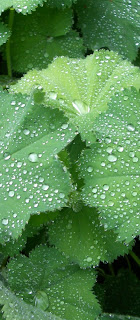Deus-sive-Natura - Personality but not a Person
 In my last blog - On not going to church on a Sunday - I cited a 'prayer' to Nature by Anthony Ashley Cooper, 3rd Earl of Shaftesbury (1671 - 1713) and prefaced it with the following words:
In my last blog - On not going to church on a Sunday - I cited a 'prayer' to Nature by Anthony Ashley Cooper, 3rd Earl of Shaftesbury (1671 - 1713) and prefaced it with the following words:As a poetic evocation of Nature it seems well worth reproducing here; but don't think I am taking this text literally - whatever Shaftsbury himself may have been thinking when he wrote it - because Deus-sive-Nature is absolutely not a person!"
I absolutely hold to this but have realised that, if I am going to be understood properly, I need to add an additional, very important, note. When I say that Deus-sive-Natura (God-or-Nature) is not a person I do not mean that I think 'it' is without subjectivity (and therefore personality). If I were doing this then I would simply be propounding another version of reductionist materialism. Instead, as most of you know, I'm trying to explore a non-theistic conception of divinity which holds together what Descartes blew asunder, namely matter and spirit. In other words I think (and here I'm citing Freya Mathews position expressed in For Love of Matter - A Contemporary Panspychism (State University of New York Press, 2003) that "physical reality as a whole, under both its material and nonmaterial aspects" needs to be seen "as constituting a genuine, indivisible unity" and that if this is the case (and I think it is) then we should regard Nature "as a subject, or field of subjectivity, to which the entire differentiated physical manifold is subjectively present" (ibid. p.47).
So, whilst Nature is not a person in any anthropomorphic sense, because 'it' is subjectival and 'it' can meaningfully be thought of as being a self. 'It' can, therefore, be addressed and encountered as an 'other.' Of course the trouble, to a great extent, lies in our language and so, as Mathews notes, "To personify natural phenomena may be the only way of representing the subjectivity of the world in humanly accessible terms" (ibid. p. 79) She continues:
To see the world in such terms is not necessarily simply to project human personalities into everything. It is not to envisage ethereal men and women in the sky or shadowy little homunculi in cockatoos and kookaburras and rocks. It is the attribution of personality per se, rather than specifically human personality, which is salient here. Human personality may be attributed to natural phenomena simply because human personality is the only model of personality we have. To think of thunder as the voice of a god then may not be to think of thunder as having human characteristics but rather to see it as emanating from a world with a distinctive personality, or subjectivity of its own. And to see ancestors in the cockatoos and kookaburras may not be to see the latter as inhabited by human spirits, but rather to see them as subjects whose subjectivity is no different, at bottom, from ours. So it may not really matter, from such a point of view, which particular story is told about a given nexus of natural phenomena. The purpose of the story is not to explain the phenomena, in something like causal terms. The purpose may rather enable us to encounter these phenomena, to respond to them appropriately and elicit their response. (ibid p. 80 - emphasis mine).


Comments
Nature as a positive definition of God draws our attention from the church to the garden. But the negation of that which is not God may have the same effect. If we refuse to worship idols - even idols made in our own image - are we not forced to find God in something at least as large as our terrestrial biosphere?
Anyway, to that word 'definition.' One of the many captivating things about Mathews' work (and I really do recommend checking her out) is that she offers a way to see that we know God-or-Nature via erotic encounter rather than knowledge. In other words we meet God-or-Nature as a subjective self who, like a human-person whom we love, we are constantly coming to know through dialogue and encounter - touch, smell, sight, sound, taste etc.. To some extent we do 'define' our loved one enough to be able to make certain generalisations about them (which helps us distinguish them in a crowd or being able noting their leading affects - but this is essentially descriptive knowledge) but they, as whole self, are beyond our knowledge, beyond our definitions. The point here is that we recognise our loved ones rather than define them - we know we are encountering them when we do; so too with God-or-Nature. In passing the language of erotic encounter probably helps us to re-consider many of the mystics - I must do this at some point . . .
What Mathews is trying to do is to help us articulate a philosophy of reaching out and longing (orexis) for the other. In other words there is a hope that some of us, at least, may not be "forced to find God in something at least as large as our terrestrial biosphere" we will simply fall in love as a natural consequence of our encounter with God-or-Nature. It is so hard not to personify God-or-Nature at this point (like the Earl of Shaftesbury) and, given my personal predilections in these matters the pronoun I so want to use is 'Her' - perhaps Lucretius' 'comfortable' Venus of whom he speaks at the start of 'De Rerum Natura.'